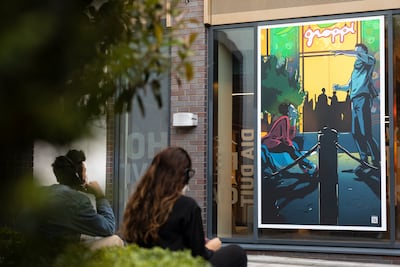At some point in their lives most women will have experienced fear and anxiety from the simple act of walking through streets alone. Sadly, many others will experience far worse than just a feeling of foreboding.
This awareness of women’s vulnerability explains why there is a “trigger warning” at the start of a new artistic audio-led walking journey in London’s East End.
Niqabi Ninja, by Egyptian playwright Sara Shaarawi, is a graphic-novel style revenge story about one woman’s transformation into a Cairene vigilante as she attempts to right the wrongs of the male violence she sees all around her. It is one of the theatrical productions in this year’s Shubbak festival of contemporary Arab art.
Shaarawi first wrote a short monologue of this now 65-minute play in 2013, as a direct response to the sexual violence female protesters in Cairo’s Tahrir Square encountered.
“I was so angry and I was so overwhelmed by what was happening and overwhelmed by the reaction because the testimonies came out,” Shaarawi tells The National, in London’s Whitechapel district where her work is displayed.
Hundreds of women reported being sexually assaulted during various phases of the Egyptian revolution between 2011 and 2013. Several organisations later collated the oral or written testimonies of the women who were subjected to attacks.
Though not a unique incident, the co-ordination and intensity of the attacks and their subsequent documentation was a “heartbreaking” watershed moment for Shaarawi.
“I wanted to make a link between all of the behaviour that we have normalised as a society and how we have put the responsibility on the women”, says the 32-year-old.
Do women need their own protective vigilante?
According to a 2013 UN report, nearly all women have experienced some sort of sexual harassment in Egypt. The problem is not the unique purview of the North African country, however. Earlier this year a YouGov poll revealed that four-fifths of all women in the UK had also experienced sexual harassment.
Misogyny, violence against women and what women are meant to do about it is the core of what Hana, Shaarawi’s protagonist, grapples with in the performance. Combining street artwork, an MP3 player and headphones, Niqabi Ninja is an immersive and intimate journey through Hana’s lifelong frustration with men’s unwelcome, and ultimately dangerous, advances on her body.

Hana, performed by Rebecca Banatvala, talks with her alter-ego, the unnamed vigilante who is ready to exact violent revenge on male perpetrators, performed by British-Lebanese singer and artist Juliana Yazbeck.
Infused with dark comedy, Niqabi Ninja is a fearless reflection on the lengths women are willing to go to keep themselves and others safe.
“She's the character that says all the things that you're not supposed to say. She's the character that enacts all of that violence that you cannot bring yourself to think about doing”, explains Shaarawi.
Walking through a busy part of London while listening to the traumas experienced by Shaarawi’s character is an invitation to experience the issue of bodies in public spaces. It is at times uncomfortable to hear and the team behind Niqabi Ninja has taken great pains to ensure audiences are comfortable, by either pairing listeners together or providing safe, quiet spaces for them to seek solace if they need to.

The comic book aesthetic of the performance’s street art allowed Shaarawi the freedom to explore women’s anger.
“Because it's so violent, but so fantastical, and so not real. And I felt like that creates a framework, or enough distance, to be able to look at that moment and not be too overwhelmed by it or too horrified.”
While her vigilante character is more than happy to sharpen her knife and throw some punches, Shaarawi doesn’t advocate violence herself.
“I think women need to be angry. But am I advocating that they should slice men’s faces? No, I don't think that — absolutely not. But for me the play, and that character, is a demand. It's a question of: is this what we need to do in order for this to stop? Is this where you're pushing us? Do we need to actually be violent back?”
Though predominantly set in Egypt, parts of Niqabi Ninja are set in the UK, where Shaarawi, who is now based in Glasgow, moved to in 2011. In one scene, set in a generic club somewhere in the UK, we hear Hana’s anxious thought process as she tries to navigate a “fun” night out while staying safe.
“I hope people reflect on how misogyny is normalised here, because it might not be exactly the same sort of way. But definitely when I moved to the UK I felt unsafe in spaces that I didn't necessarily feel unsafe in Cairo”, says Shaarawi.
Indeed, in the year that the murder of Sarah Everard in London on her walk home one evening shook the country, the universality of the issue is what Shaarawi wants audiences to reflect on. Thankfully, there will be several opportunities to do so over the summer. Londoners can catch Niqabi Ninja at Toynbee Studios until July 17, before it goes on a tour around Scotland throughout August, including at the Edinburgh Fringe Festival.


